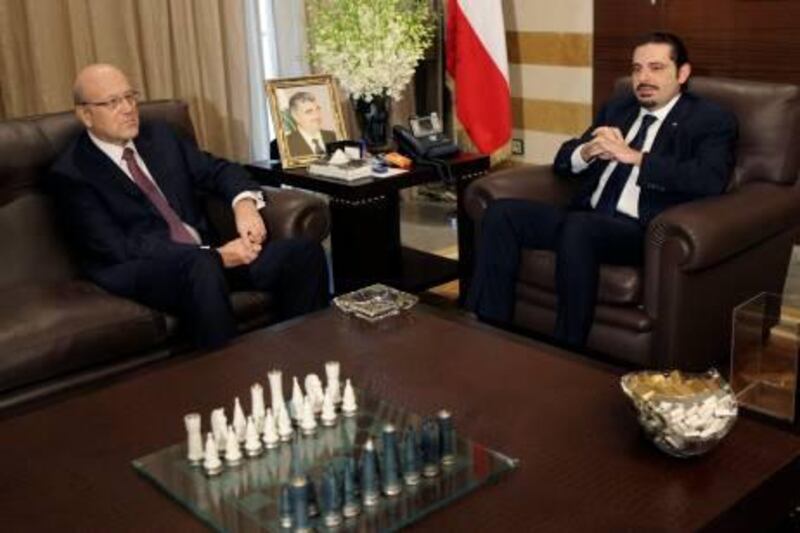DAMASCUS // Washington's dismay at the appointment of a Hizbollah candidate to Lebanon's premiership could scarcely contrast more with the delight expressed in Damascus.
With the replacement of Saad Hariri, the outgoing pro-Western Lebanese prime minister, Syria sees the era of US influence in its neighbourhood withering.
Najib Miqati, selected on Tuesday to be premier by the Lebanese parliament, is the first prime minister to be nominated by Hizbollah, the Islamic resistance movement backed by Syria and Iran in its opposition to Israel and the United States.
"The American-Israeli age in Lebanon is finishing," said Umran Zaubie, a Syrian lawyer who has specialised in the legal cases surrounding the assassination of Rafiq Hairi, the Lebanese prime minister assassinated in 2005, and Saad's father.
It is that murder, and the UN tribunal seeking to prosecute those behind it - Hizbollah members are widely thought to have been indicted - that has caused the latest crisis in Lebanon.
It has also played a role in Hizbollah's political ascendency, pushing the group to withdraw its ministers from Mr Hariri's administration this month, when he refused to withdraw Lebanon's support for the tribunal. That caused the government to collapse and put Hizbollah in the position to form its replacement.
Like other Syrians who commented on the new Lebanese prime minster, Mr Zaubie was adamant that Mr Miqati was not a puppet of Damascus or Tehran and would draw up his own political programme. He was equally insistent, however, that Mr Miqati would not closely ally himself to the West, as Mr Hariri had done.
"The coming Lebanese government cannot be called Syrian or Iranian," Mr Zaubie said. "But certainly we will not watch an Israeli-American cabinet in Lebanon."
There has been no official reaction from the Syrian authorities to Mr Miqati's nomination. Damascus has a close relationship with him - he is a personal friend of the Syrian president, Bashar al Assad - but insists the matter is a Lebanese affair.
However, there is an expectation in Syria that once the new government takes office, it will dispense with the UN tribunal, as Hizbollah, Damascus and Tehran have insisted. Mr Miqati met Mr Hariri for 15 minutes yesterday, but neither man spoke to the media afterward to clarify Lebanon's future relations with the tribunal.
Hizbollah and Syria view the tribunal as a political witchhunt designed to weaken anti-Israeli forces, rather than an impartial effort to prosecute the assassins.
"The Hariri tribunal will be finished," said a member of Syria's ruling Baath party. "The Lebanese cannot just order the UN to cancel it, but the new government will withdraw its support.
"There will be no Lebanese financing, no Lebanese judges, no Lebanese participation. They will cancel the protocols the previous government agreed to [relating to the tribunal]. If the UN are told the Lebanese don't want it, it's effectively finished even if it's still there in name."
Philip Crowley, the US State Department spokesman, was adamant, however, that the tribunal would not disappear. "The work of the Special Tribunal for Lebanon is of vital importance to stability, security and justice in Lebanon. Its work will continue," he said in a statement on Tuesday, which also accused Hizbollah and Syria of hijacking Lebanon.
"The make-up of Lebanon's government is a Lebanese decision, but this decision should not be reached through coercion, intimidation and threats of violence," he said. "Unfortunately, Hizbollah, backed by Syria, engaged in all three in pursuit of its political goals."
Khaldoon Qassam, vice chairman of the foreign affairs committee in Syria's parliament, said interference from the US had, in fact, precipitated the crisis by undermining regional mediation attempts.
A plan jointly brokered by Syria and Saudi Arabia and designed to stop Hizbollah from pulling out of Saad Hariri's cabinet, fell through earlier this month. Syrian sources maintain the deal had been agreed among Lebanon's various factions, until last-minute intervention by the US caused Mr Hariri to back out.
"The target of the Syrian-Saudi policy was calm and stability," Mr Qassam said. "The Americans and some other countries are pushing from outside of Lebanon for the Hariri tribunal, and that is working against Lebanese aspirations and security."
He dismissed claims of Syrian interference, accusing the US of preaching non-intervention in Lebanon while openly supporting the Hariri faction.
"The US should not build its policy on supporting one side. It should be neutral in these issues. Barack Obama came to power pushing dialogue but we have not seen action from him to back that up. He supports one team against the other. We need him to be impartial."
The US considers Hizbollah a terrorist organisation. Since 2006 Washington has provided Lebanon with US$720 million (Dh2.6 billion) in military aid, part of its effort to bring the country firmly into a Western sphere of influence and to cut Iranian and Syria power there.
The US secretary of state, Hillary Clinton, said on Tuesday: "A Hizbollah-controlled government would clearly have an impact on our bilateral relationship with Lebanon."
Mr Miqati has said he wants to build a national unity administration, including Saad Hariri's bloc. He also rejected suggestions he would simply follow Hizbollah and be opposed to the West.
"I am not in a confrontation with the West," he told a Lebanese television station. "We are looking to build good relations." Hizbollah leader Hassan Nasrallah has also said his movement is not looking to take over Lebanon. "The new government will not be a Hizbollah government nor will it be led by Hizbollah … We don't want power," he said.
Meanwhile, the Saudi foreign ministry has advised its citizens against travelling to Lebanon "until the return of calm and stability", the official SPA news agency reported yesterday.





